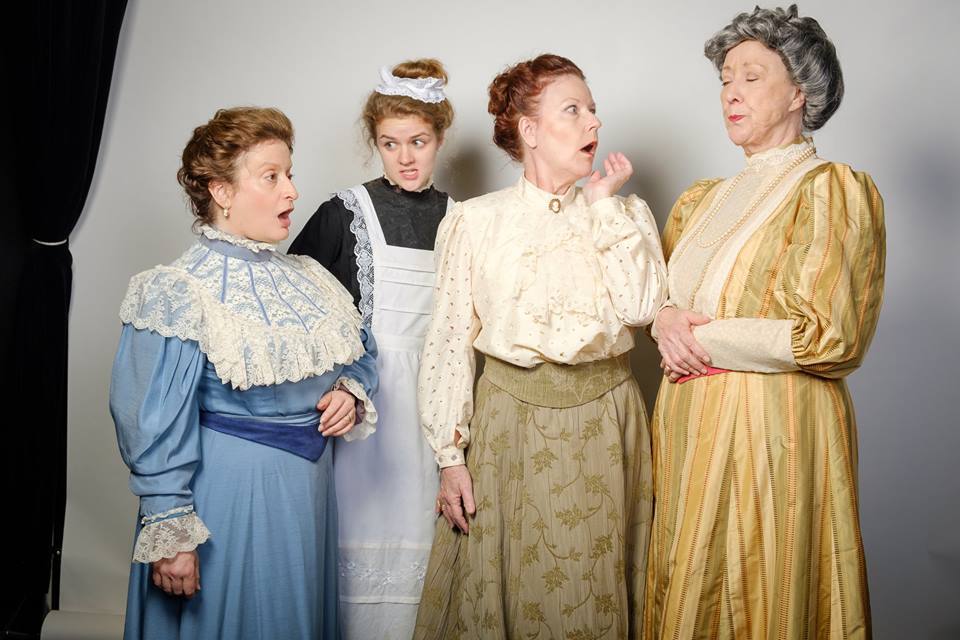Review: WHEN WE ARE MARRIED is a comedic look at the absurdity of past societal standards.

Katherine Schroeder, and Susan Roberts.
Courtesy of Brett Brookshire
When We When Are Married is the first production of 2018 from Different Stages. Penned by J.B. Priestly, the original production opened in London in 1938 and the 1985 West End revival went on to win the Oliver Award for Best Play. It also holds the distinction of being the first play to be televised unedited when it was broadcast by the BBC in 1938. In addition to receiving film and TV adaptations over the years, the play has also been broadcast several times by radio across the U.K.
When We Are Married opens on a group of three couples in a small town in Yorkshire, England in 1908. Married on the same day in the same chapel twenty-five years ago, the couples Alderman Joseph (Mick D'Arcy) and Maria Helliwell (Katherine Schroeder); Herbert (Stephen Fay) and Clara Soppitt (Susan Roberts); and Counselor Albert (Ian King) and Annie Parker (Mirium Rubin) have all gathered together to celebrate what should be their silver wedding anniversary. The happy celebration is brought to a halt when the new chapel organist, Gerald Forbes (Will Gibson Douglas), comes bearing a letter alluding that the parson that married them may not have been authorized to perform the act. Believing they have been living in sin for twenty-five years, these prominent members of local society quickly descend into chaos as they try to keep a lid on the scandalous secret.
Performances by the fourteen-person cast are varied, but for the most part, well done. As the couples thrown into an uproar, the six lead actors all work well as a group and exhibit a natural rapport. Special mention must be given to Stephen Fay as the "hen-pecked" Herbert Soppitt, who fully recognizes his characters' quiet, cautious nature. His witty, but reserved approach makes Soppitt's rebellious streak in act two even more rousing and humorous. Other notable performances include Mirium Rubin as the long-suffering Annie Parker, Shonagh Smith as lively, young maid Ruby Byrtle, and Derek Webster as the tipsy press photographer, Henry Ormondroyd.
Despite the several stand out performances, the production itself feels at times disconnected. Comedies, especially those that feel farce in nature thrive on energy and pacing. Unfortunately for this production, it is unstable in both areas several times. Dialogue and exchanges between characters originally designed to garner comedic response feels rushed and unexamined. Unpolished regional dialect work also lends to the unevenness in the production. While most of the cast are able to manage the beginnings of the Yorkshire dialect, certain actors are very difficult to understand, leaving whole sentences unrecognizable. Others struggle with an accent that barely resembles Standard British. Shonagh Smith is the exception as Scottish maid, Ruby.
The technical elements were a bright spot of this production. Ann-Marie Gordon's design of the Helliwell's well-appointed sitting room is executed precisely. Gordon's attention to detail in the modest, yet elegant space; from the floors painted to look like wood to the subtle shading on the walls indicating the room's age, is both impressive and beautiful. Costume design by Ann Ford is also timely and elegant. Ford's designs manage to not only to fit the historical context of the play but also are well tailored to suit each actor. Lighting by Amy Lewis and sound by Jeff Miller also help round out the show's strong technical aspects.
In a modern, progressive world, Different Stages' production of WHEN WE ARE MARRIED is a comedic look at the absurdity of past societal standards. The story of these socially elite characters may be found humorous for very different reasons now than why it was originally successful in 1938. Though the production struggles occasionally, it does make for an entertaining and enjoyable evening.
WHEN WE ARE MARRIED is now playing at Trinity Street Theatre at (4th floor, First Austin Baptist Church 901 Trinity Street Austin, 78701) until February 2nd. Runs Thursday through Saturday at 7:30pm and Sundays at 3:00pm.
Approx. running time: Two hours and ten minutes, with one ten-minute intermission.
Tickets (prices varies upon dates):
General Admission- $15-$20
I Like Different Stages- $20-$25
Priority Seating- $25-$30
More info or call (512) 926-6747
Reader Reviews

Videos

